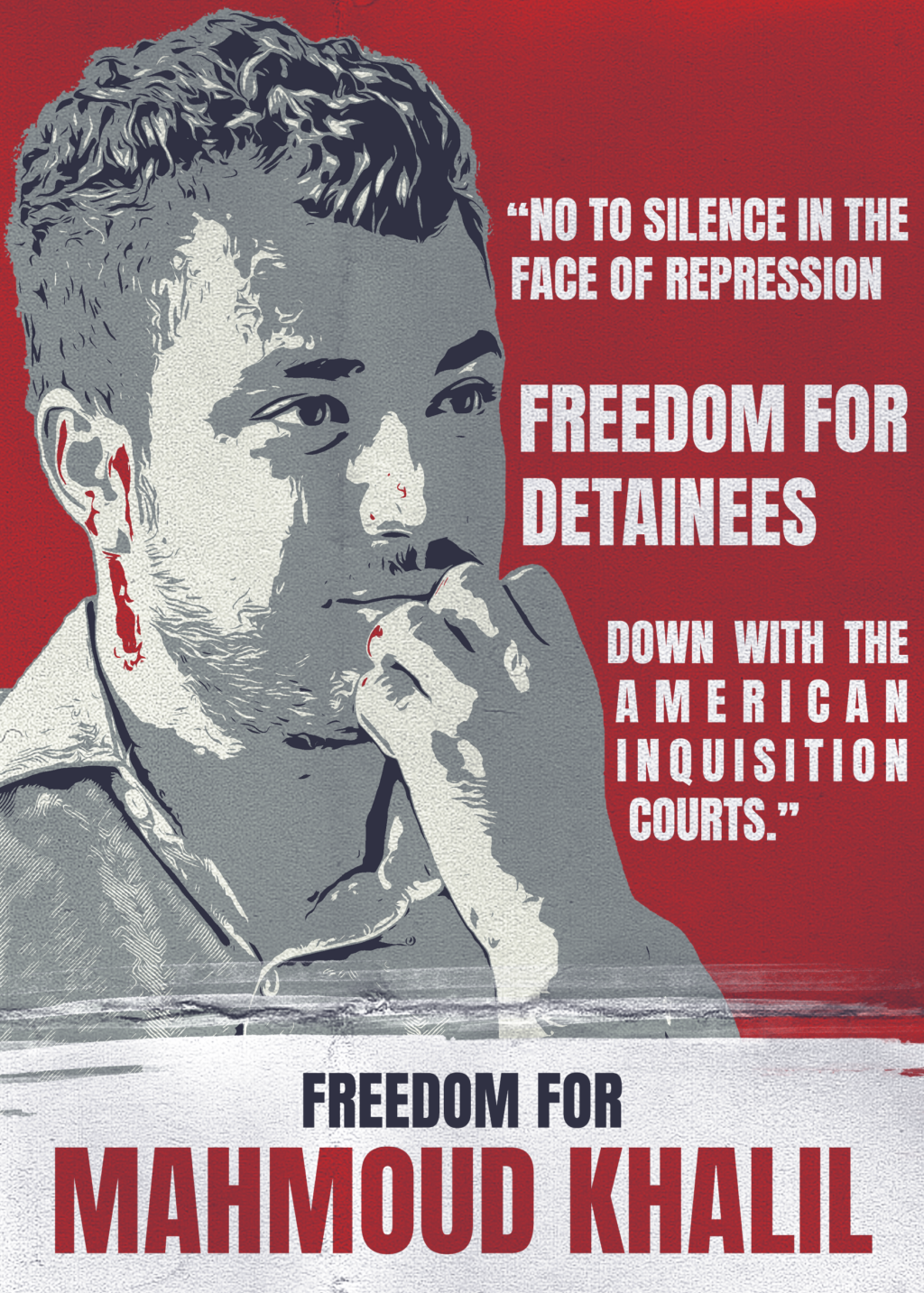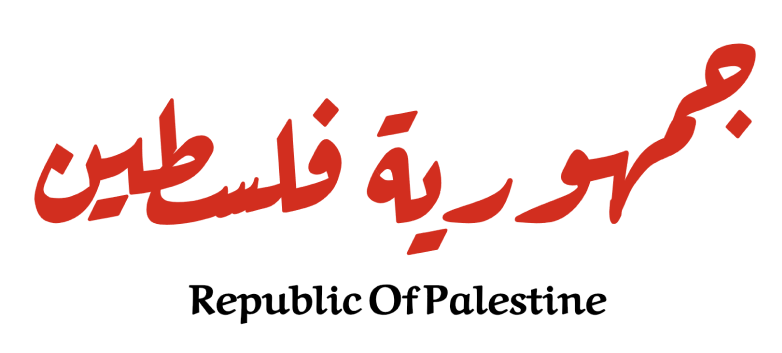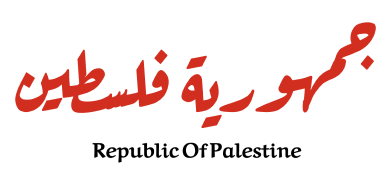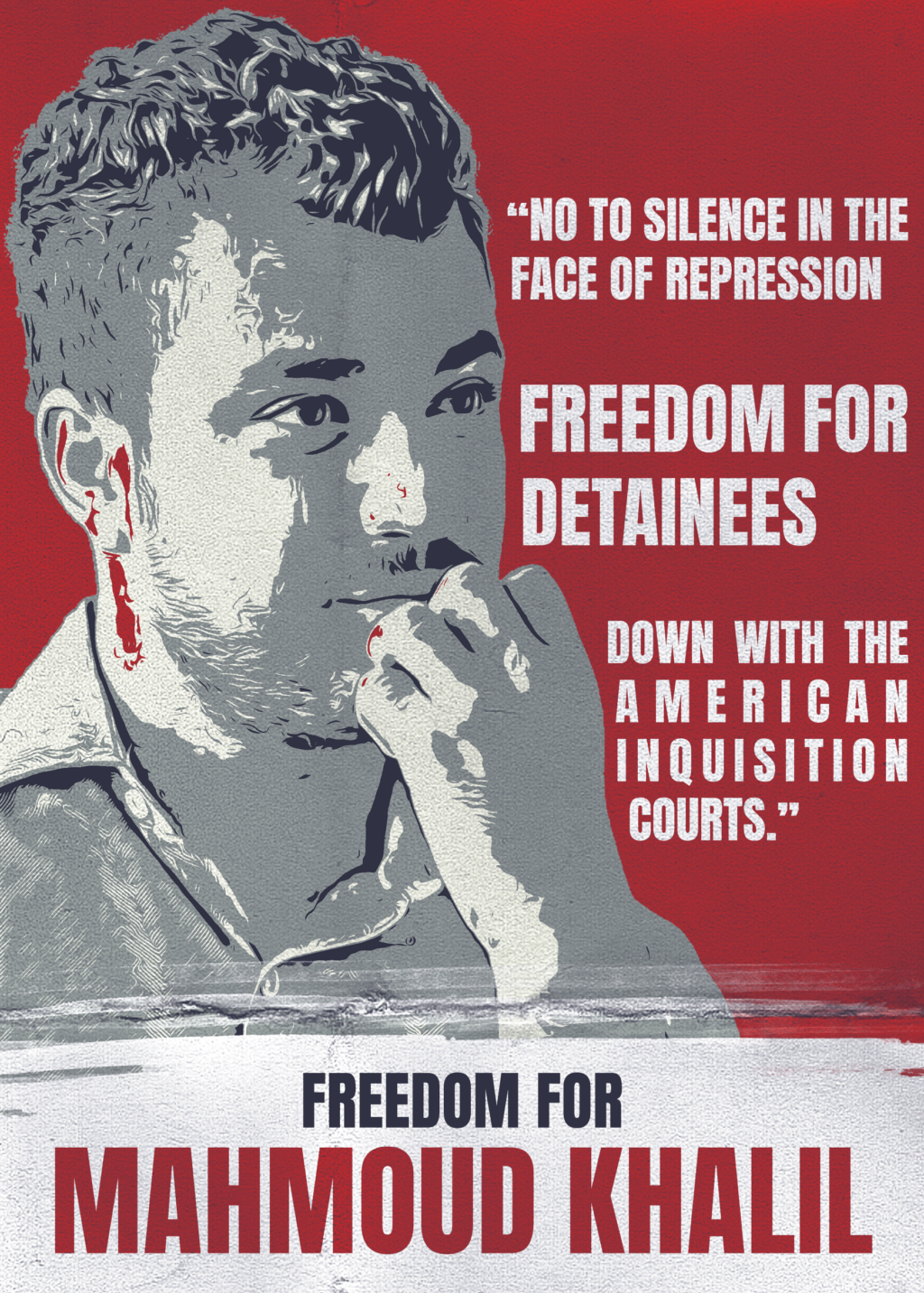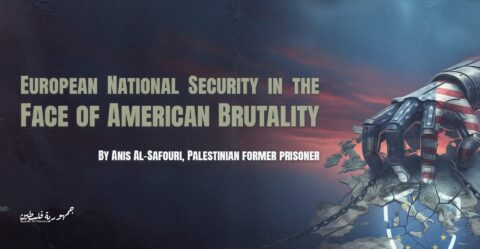Last weekend, alarming news broke out regarding a Palestinian Syrian graduate student at Columbia, Mahmoud Khalil, being confronted by Department of Homeland Security (DHS) officers at his university housing unit. Khalil, a green card holder whose wife is eight months pregnant, was effectively abducted by the DHS after being told that his green card has been revoked. Following his abduction, the U.S. government transferred him from an Immigration and Custom Enforcement (ICE) facility near his home state in New Jersey to a facility over 1,300 miles away in Louisiana. Despite clear efforts by ICE, the DHS, and the Trump administration to expedite his deportation – a federal judge has ordered that he remains in the country until his proceedings are concluded. Today, Khalil remains in ICE detention, with his return date to New York being unclear.
The chilling effect of this attack has reverberated across the nation, but for those who have been following the escalating repression against the student movement for Palestine even prior to the election of President Trump, this development has felt like a long time coming. In fact, 2024—the last year of the Biden’s administration—was a record-breaking year for the number of arrests to have taken place on university campuses in the U.S. Thousands of students across the country were arrested, subjected to police brutality, university proceedings, and more. Their alleged “crime” or “student conduct violation” was protesting their universities’ support for the U.S.-Israel genocide in Gaza and profitting from it through their financial investments in the weapons manufacturing industry.
The dramatic rise of the student movement for Palestine occurred simultaneously with the growing global solidarity movement for the Palestinian national liberation project. Since October 2023, thousands have organized new formations, millions have taken to the streets, and voices in every corner of the world have echoed calls for the freedom of the Palestinian people and land. In an unprecedented fashion, the mainstream narrative—particularly in the U.S. and the West—began to shift on the Palestinian struggle. In the absence of real interventions to stop the genocide in Gaza, the masses around the world turned their cities into sites of struggle and grounds of confrontation.
University students across the world assumed this role seriously. For nearly two decades, student groups—specifically, in the U.S., Canada, and Europe—have demanded that their universities cut their financial and institutional ties with the state of Israel. Hundreds of student resolutions and referendums were passed demanding material and academic divestment from the state of Israel; however, these efforts almost never passed the symbolic stage. The waging of the genocide propelled the student movement to progress from demanding symbolic changes to material ones as their university’s complicity in the genocide began to be laid bare. There is a dialectical relationship between the imperialist network facilitating this genocide and the student movement that explains why as the violence against Palestinians escalated, so did the tactics of the students. However, there is a fundamental difference in these escalations–while Israel and the U.S. escalated in their acts of genocide; the students escalated to demand an end to that genocide.
This distinction is critical because the popular discourse around the student uprisings and the encampments decontextualize them, with both liberals and conservatives alike characterizing them as “extreme” and “antisemitic.” The second categorization is critical to focus on here, as accusations of antisemitism have become the primary basis for the targeting of the student movement. In fact, President Biden was one of the first politicians to condemn the protests at Columbia University in April of 2024, labeling students’ activities’ as “blatant” antisemitism. This isn’t new, accusations of antisemitism have long been weaponized against advocates of Palestinian liberation, and in the last several decades, there has been an intentional push for the adoption of the International Holocaust Remembrance Alliance (IHRA) definition of antisemitism, which includes criticism of the Zionist entity as antisemitic. For this reason, we must not be fooled by what appears to be liberal uproar against President Trump’s targeting of Khalil and other students for their Palestine-related organizing. In fact, it is the democratic party and its leadership that has set the foundation for Trump’s extreme policies today.
What drives this consensus amongst democrats and republicans around repressing the Palestine movement is their shared Zionist and imperial interests, as well as their clear intentions to quell the rising movement for Palestine in the U.S. While democrats and republicans may differ on their favored methodology of quelling this movement, they are united on the eagerness to repress it. The extreme violence enacted by the colonial entity of Israel, the endless material, military, and diplomatic support it received from the U.S., and the inability of the international community to intervene in a genocide documented on social media have been nothing short of awakening for the masses around the world. The peaceful mirage that Israel had carefully constructed since its founding, was shattered in a matter of months, revealing to the whole world it’s true image of nothing more than a settler state founded and perpetuated by the genocide of Palestinians.
The truth is, the student movement for Palestine—and the pro-Palestine movement as a whole—has created various crises for the ruling class of this country. The student encampments kicking off at an ivy league institution like Columbia and quickly igniting a wave of uprisings at other universities across the country signified a critical shift in popular consciousness on U.S. imperialism and the role of the institutions in the imperial core in preserving Zionist interests. Universities that have long been praised for being epicenters of social and political progress called on state forces to brutalize students on their own campuses. Universities that pride themselves on divesting from Apartheid South Africa and private prisons outright refused to divest from corporations making hundreds of millions on the slaughter of the Palestinians in Gaza. The actions unveiled universities as simple sites of social reproduction invested in creating a generation of students void of any critical thinking skills and denuded of any impulse to see themselves as vehicles and subjects of change.
These contradictions, heightened through confrontation, tore the very fabric of the empire’s deception. This analysis allows us to understand this moment of repression as larger than the Trump administration’s targeting of a green card holder for protected acts of free speech, as some may attempt to frame the arrest of Khalil as. What exactly comes next for the Palestine movement in the U.S., and for the students specifically, remains unclear – but anticipation of increasing repression, potential criminalization, and continued attacks on individuals most vulnerable all seem to be in the trajectory. The response of the pro-Palestine movement and those in solidarity is especially critical during these times, we must seek to protect our students and quell the clear efforts to destroy the foundation of our movement in the U.S.
The editorial team of Republic of Palestine.
